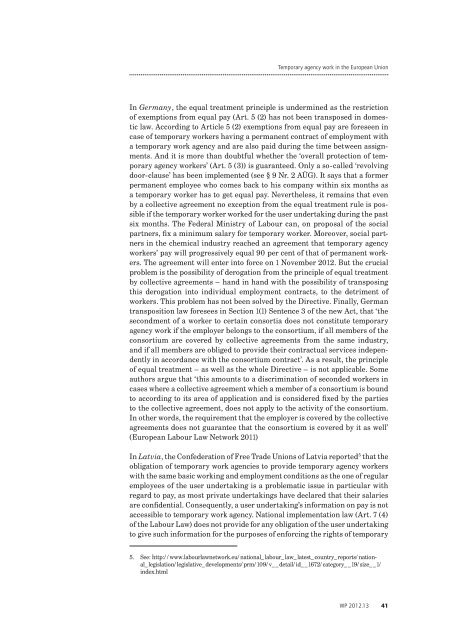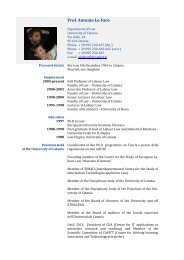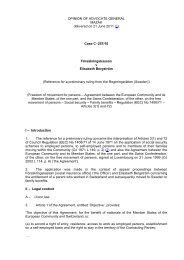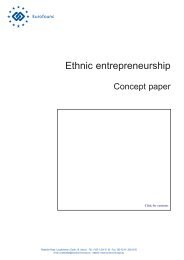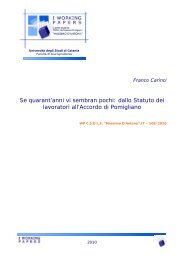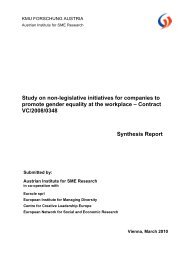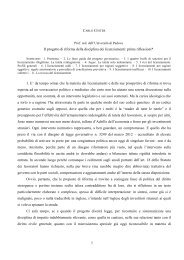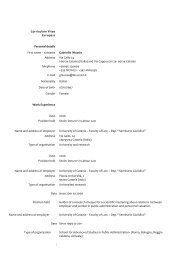Full text - European Trade Union Institute (ETUI)
Full text - European Trade Union Institute (ETUI)
Full text - European Trade Union Institute (ETUI)
Create successful ePaper yourself
Turn your PDF publications into a flip-book with our unique Google optimized e-Paper software.
Temporary agency work in the <strong>European</strong> <strong>Union</strong><br />
In Germany, the equal treatment principle is undermined as the restriction<br />
of exemptions from equal pay (Art. 5 (2) has not been transposed in domestic<br />
law. According to Article 5 (2) exemptions from equal pay are foreseen in<br />
case of temporary workers having a permanent contract of employment with<br />
a temporary work agency and are also paid during the time between assignments.<br />
And it is more than doubtful whether the ‘overall protection of temporary<br />
agency workers’ (Art. 5 (3)) is guaranteed. Only a so-called ‘revolving<br />
door-clause’ has been implemented (see § 9 Nr. 2 AÜG). It says that a former<br />
permanent employee who comes back to his company within six months as<br />
a temporary worker has to get equal pay. Nevertheless, it remains that even<br />
by a collective agreement no exception from the equal treatment rule is possible<br />
if the temporary worker worked for the user undertaking during the past<br />
six months. The Federal Ministry of Labour can, on proposal of the social<br />
partners, fix a minimum salary for temporary worker. Moreover, social partners<br />
in the chemical industry reached an agreement that temporary agency<br />
workers’ pay will progressively equal 90 per cent of that of permanent workers.<br />
The agreement will enter into force on 1 November 2012. But the crucial<br />
problem is the possibility of derogation from the principle of equal treatment<br />
by collective agreements – hand in hand with the possibility of transposing<br />
this derogation into individual employment contracts, to the detriment of<br />
workers. This problem has not been solved by the Directive. Finally, German<br />
transposition law foresees in Section 1(1) Sentence 3 of the new Act, that ‘the<br />
secondment of a worker to certain consortia does not constitute temporary<br />
agency work if the employer belongs to the consortium, if all members of the<br />
consortium are covered by collective agreements from the same industry,<br />
and if all members are obliged to provide their contractual services independently<br />
in accordance with the consortium contract’. As a result, the principle<br />
of equal treatment – as well as the whole Directive – is not applicable. Some<br />
authors argue that ‘this amounts to a discrimination of seconded workers in<br />
cases where a collective agreement which a member of a consortium is bound<br />
to according to its area of application and is considered fixed by the parties<br />
to the collective agreement, does not apply to the activity of the consortium.<br />
In other words, the requirement that the employer is covered by the collective<br />
agreements does not guarantee that the consortium is covered by it as well’<br />
(<strong>European</strong> Labour Law Network 2011)<br />
In Latvia, the Confederation of Free <strong>Trade</strong> <strong>Union</strong>s of Latvia reported 5 that the<br />
obligation of temporary work agencies to provide temporary agency workers<br />
with the same basic working and employment conditions as the one of regular<br />
employees of the user undertaking is a problematic issue in particular with<br />
regard to pay, as most private undertakings have declared that their salaries<br />
are confidential. Consequently, a user undertaking’s information on pay is not<br />
accessible to temporary work agency. National implementation law (Art. 7 (4)<br />
of the Labour Law) does not provide for any obligation of the user undertaking<br />
to give such information for the purposes of enforcing the rights of temporary<br />
5. See: http://www.labourlawnetwork.eu/national_labour_law_latest_country_reports/national_legislation/legislative_developments/prm/109/v__detail/id__1672/category__19/size__1/<br />
index.html<br />
WP 2012.13 41


